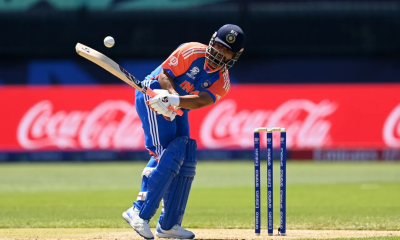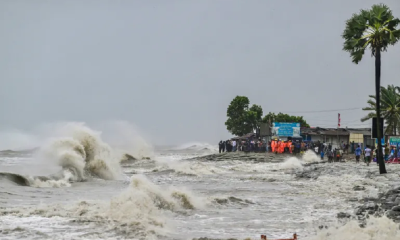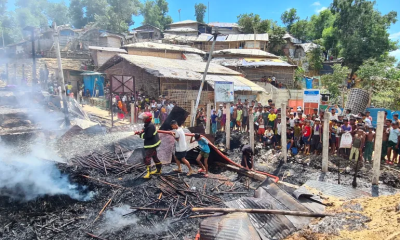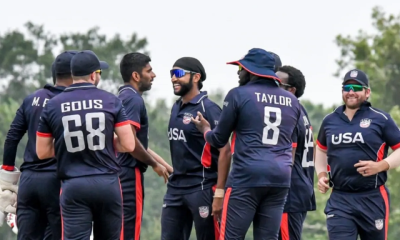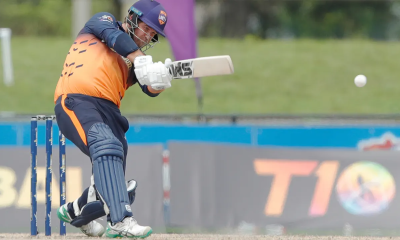Latest News
Sheikh Hasina wins fifth term in Bangladesh amid turnout controversy
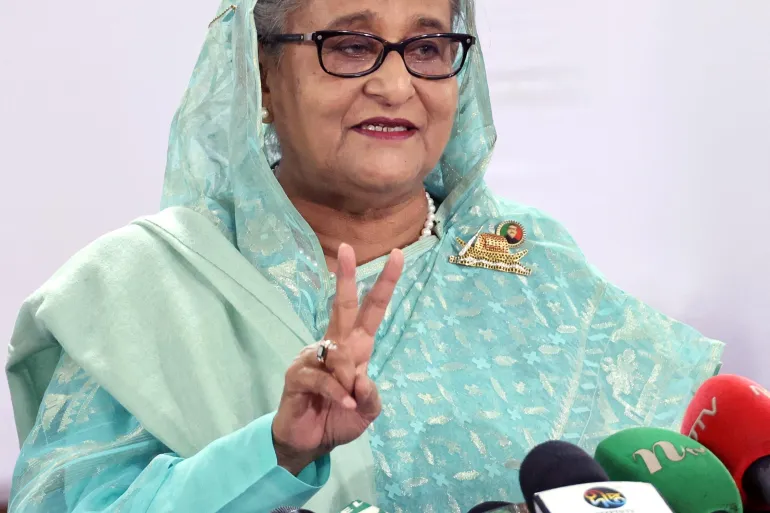
Sheikh Hasina has secured her fifth term as Bangladeshi prime minister in an election whose outcome was decided the moment its schedule was announced in early November when the main opposition boycotted the poll.
The surprise was who came second.
Instead of any political party, independent candidates secured a total of 63 seats, the second highest after Hasina’s Awami League (AL), which won 222, creating a problem of finding a parliamentary opposition.
The current opposition, the Jatiya Party, managed to secure just 11 of the 300 parliamentary seats, according to the Elections Commission.
Almost all the winning independent contenders were people who had been rejected by the AL but were asked by the party leadership to stand as “dummy candidates” to give the election a competitive veneer in front of the world.
“This is a bizarre outcome of a bizarre election,” Shahidul Alam, a renowned Bangladeshi rights activist and photographer, told Al Jazeera. “Dummy candidates in a dummy election will now lead to a dummy parliament.”
Shunned by the Bangladesh Nationalist Party (BNP) – the AL’s main political opponent – which wanted the balloting held under a neutral entity instead of Hasina’s administration, Sunday’s “one-sided election” was just a “mere formality” to put Hasina back in power again, analysts say.
The only suspense, they added, was voter turnout, after Western governments put pressure on Hasina’s government to ensure a free, fair and participatory poll.
After polling closed at 4pm (10:00 GMT on Sunday), the Election Commission (EC) said turnout was 40 percent. But many were doubtful it was even that high. “I don’t know about the rest of the country but I think I have not seen such an empty Dhaka in years,” Abdullah Yusuf, an engineer in the Dhanmondi area of the capital, told Al Jazeera. “It felt like the initial COVID days. I crossed two polling centres midday and didn’t see many people besides Awami League activists who were wearing badges. EC’s claim of 40 percent is quite absurd.”
Some analysts, meanwhile, pointed to confusion at the EC announcement. “It’s hard to believe the turnout was 40 percent, especially given the fact that the chief election commissioner himself uttered 28 percent first while briefing the media and then changed it to 40 percent all of a sudden,” said Sakhawat Hossain, a former election commissioner.
The turnout figure, which was shown on the dashboard at the EC headquarters hours after the briefing, was 28 percent, and a photo of it was widely circulated in the country’s social media and received criticism. Al Jazeera checked and verified that figure. EC earlier declared at an hour before the poll closing that the turnout was about 27 percent. Al Jazeera visited at least 10 polling stations across the capital Dhaka in the last hour and did not see any voters.
Sharmin Murshid, the head of the reputed election observer organisation Brotee, told Al Jazeera that a jump from 27 to 40 in a span of an hour or so was “ridiculous” and had “tainted the EC reputation severely”. “It was a sure way to further lose the confidence of the people and credibility which it did not have to start with,” she said. “This was not an election, rather it was an exercise in casting votes by one party for one party,” she added.
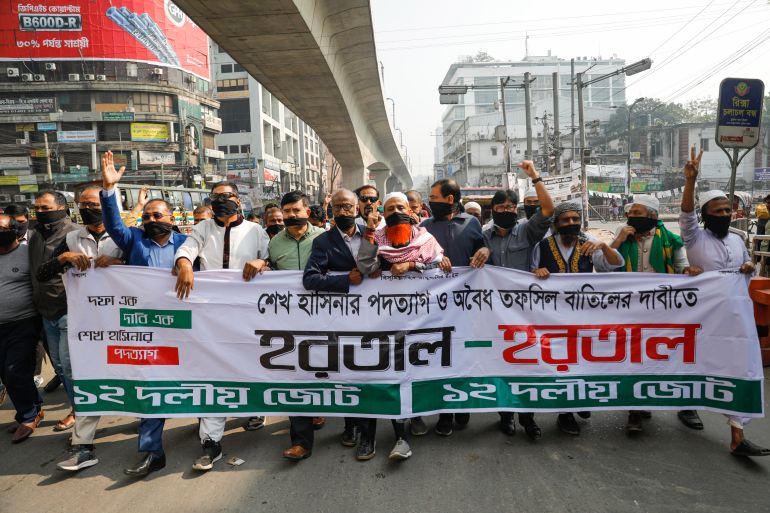
BNP leaders, meanwhile, termed even 28 percent very high, saying that most of the polling booths across the country had been empty throughout the day. The opposition party earlier declared a 48 hour ‘hartal’, equivalent to a total strike, from Saturday morning, which it believed also reduced turnout.
“In most pictures and footage shared in media and social platforms, you would find photos of dogs standing, lying down and basking in the sun along with police and a few Awami League activists,” said Abdul Moyeen Khan, a senior BNP leader, while briefing journalists after the election, “But no voters.”
Khan said people had heeded their call to boycott ballots and show a “red card” to the election. “Even Awami League supporters didn’t bother to go to booths to cast their votes because they knew their candidates would win anyway,” he added.
Concerns on legitimacy
AL leaders, however, said the BNP’s plan to foil the election through “hartal” and “arson attacks” had not paid off because people did turn out to vote.
“This is a victory for our democracy,” Obaidul Quader told the media after finding a clear lead in poll results, “People give BNP’s terrorism befitting reply through balloting.”
Quader also said most people voted for their preferred candidates without any intimidation or interference in voting. “This was one of the most peaceful elections of the country,” he said.
While the last two national elections were tainted with dozens of deaths and severe violence, Sunday’s poll saw only one death and very few clashes, making it one of the most peaceful polls in the South Asian nation’s history.
“People of your country should be proud of holding such a peaceful election,” Hisham Kuhail, the CEO of the Central Election Commission of Palestine, one of several foreign observers of the poll, told a media briefing afterwards.
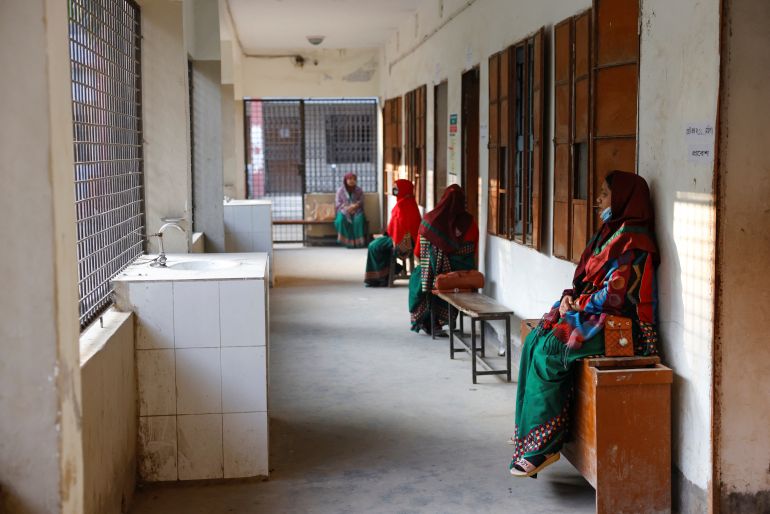
Kuhail, however, avoided questions about voter turnout and said he was assessing only the technicalities of the voting process – whether voters were allowed access and whether voting took place systematically. “I cannot comment on the political scenario here. For that I need to stay at least a month,” he added.
Russian observer Andrei Shutov also said the voting process was systematic and peaceful. “This election is legitimate,” he added.
AKM Wahiduzzaman, the information and technology affairs secretary of the BNP, said there was no question it was peaceful because “there were no voters”. “But it is obviously not legitimate,” he said. The Awami League’s victory, he added, was “illegal and illegitimate” because people did not “legitimise them through votes”.
(Aljazeera)
Latest News
‘Bloody policies’: MSF recovers 11 bodies from Mediterranean off Libya

The aid group Doctors Without Borders has reported recovering 11 bodies and rescuing dozens of people off the coast of Libya as it criticised the migration policies of the North African country and European countries.
In a statement on Friday, the group, known by its French initials MSF, said its Geo Barents rescue vessel managed to recover the bodies following a search operation lasting more than nine hours after being alerted by German nongovernmental organisation Sea-Watch, which also rescues refugees and migrants.
“As we cannot determine the reason behind this tragedy, we know that people will continue to take dangerous routes in a desperate attempt to reach safety, and Europe must find safe and legal pathways for them,” MSF said in a post on X. “This catastrophe must end!”
Sea-Watch said it is unclear whether the bodies were victims of a previously unknown shipwreck, adding that they tried to contact Libya’s coastguard to go and retrieve the dead, but received no reply.
“The so-called Libyan coastguard – financed by the EU – ignored our call demanding that the bodies be recovered,” the group said.
Thousands of people trying to head from Africa to Europe use Libya as a departing point, with the Italian island of Lampedusa the nearest European destination as they undertake the dangerous journey across the Mediterranean to escape war, poverty and persecution.
Italy, which wants to put a stop to the migration stream, has said Libya and neighbouring Tunisia must do more to stop people from going to sea. It has also clamped down on the operation of the rescue ships, arguing that they encourage people to head to Europe, a charge that is denied by the charities.
Emphasising its policy on the rescue ships, Italy said on Friday that it forced the MSF rescue vessel to take the 165 people that it had saved from boats in the Mediterranean operation to the northern port of Genoa. The port was more than 650 nautical miles (1,200km) from their position and much farther than the more convenient ports in nearby Sicily, significantly delaying assistance to the rescued.
The route in the central Mediterranean is the most dangerous migrant crossing in the world, with the United Nations registering more than 20,000 deaths and disappearances in the area since 2014.
More than 3,000 refugees and migrants went missing in 2023 while attempting to use the route, according to the International Organization for Migration.
According to Italy’s interior ministry, the number of arrivals in the country has dropped in 2024 to fewer than 21,800 people since the beginning of the year, compared with close to 53,300 in the same period last year.
[Aljazeera]
Latest News
Mustafizur, Rishad, Hridoy dazzle in Bangladesh’s tight two-wicket win over Sri Lanka
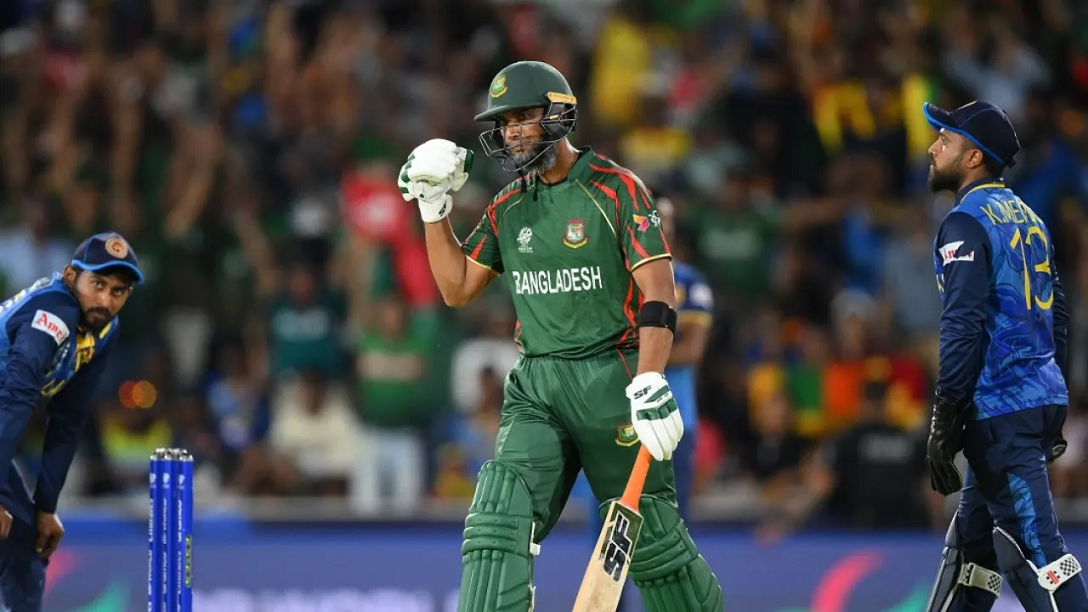
Nuwan Thushara’s last over brought Sri Lanka screaming back into the match,as he first bowled Rishad Hossain, and then nailed Taskin Ahmed in front of the stumps with a pinpoint swinging yorker. This left Bangladesh eight wickets down, with 12 runs still to get.
However, the experienced Mahmudullah was at the crease for Bangladesh, and despite some further nervy moments, pushed Bangladesh across the line off the last ball of the 19th over.
But this was a match chiefly decided by Bangladesh’s own outstanding bowling. Mustafizur Rahman was the best among them, using shorter lengths and his cutters efficiently, to claim figures of 3 for 17. Rishad Hossain’s three-for through the middle overs also kept Sri Lanka quiet.
Mustafizur was instrumental in Sri Lanka’s downward spiral through the middle overs, which culminated in a crash-and-burn end. Ultimately, their inability to find boundaries, or even rotate strike against good Bangladesh bowling resulted in their downfall. A score of 125 for 9 always seemed poor on a decent pitch, even if their bowlers made a match of it in the end.
Brief scores:
Bangladesh 125 for 8 in 19 overs (Towhid Hridoy 40, Litton Das 36; Dhanajaya de Silva 1-11, Nuwan Thushara 4-18, Wanidu Hasaranga 2-32, Matheesha Pathirana 1-27) beat Sri Lanka124 for 9 in 20 overs (Pathum Nissanka 47, Dhananjaya de Silva 21; Tanzim Hasan Sakib 1-24, Taskin Ahmed 2-25, Mustafizur Rahman 3-17, Rishad Hossain 3-22) by two wickets
[Cricinfo]
Latest News
Rashid, Farooqi and Gurbaz the stars as Afghanistan crush New Zealand

Afghanistan boosted their Super Eight chances with yet another dominating win, this time thumping New Zealand by 84 runs in Providence. Having beaten Uganda by 125 runs in their opening match, they are now at the top of Group C with a net run rate of 5.225.
After being sent in, Rahmanullah Gurbaz and Ibrahim Zadran gave Afghanistan a start of 103 in 14.3 overs. It came off the back of the 154 the pair added against Uganda, thus making them the first opening pair to register two successive century stands in the history of the T20 World Cup.
Afghanistan’s was an innings of two halves. They scored 55 for no loss in the first ten overs and 104 for 6 in the last ten, with Gurbaz contributing 80 off 56 balls. New Zealand, who had decided not to play any warm-up games, looked every bit rusty as their fielders dropped catches and missed run-out opportunities.
With the pitch assisting both seamers and spinners, chasing 160 was not going to be easy. But few would have expected New Zealand to collapse in the manner they did.
Fazalhaq Farooqi picked up three wickets in the powerplay and Rashid Khan three just after it. Eventually, both ended with identical figures of 4 for 17 as New Zealand were bowled out for 75 in the 15.2 overs. Glenn Phillips and Matt Henry were the only New Zealand batters to reach the double digits.
Trent Boult found some swing in the opening over but Gurbaz and Ibrahim showed their intent by picking up three fours off Henry from the other end. Both batters had luck on their side, too. Gurbaz got a second life when he skipped down the track to Santner and missed the ball, which went on to brush the leg stump but the bails did not budge. In the following over, Finn Allen dropped Ibrahim off Henry at the deep-square-leg boundary.
That was not all. Gurbaz got another reprieve after being involved in a miscommunication with Ibrahim. Having taken off for a single, Gurbaz had to retrace his steps and would have been run out had Conway not fumbled the throw.
Two balls later, New Zealand finally seemed to have found success when Santner pinged Ibrahim’s pads and umpire Kumar Dharmasena ruled it lbw. But the batter got the decision overturned on review as the ball was heading down the leg side. Immediately after that, Ibrahim hit Santner for an inside-out four as Afghanistan ended the powerplay on 44 for no loss.
New Zealand went against the prevailing wisdom of not bowling an offspinner when two right-hand batters at the crease, and Michael Bracewell repaid that faith by conceding only six off his first two overs.
Lockie Ferguson was even more frugal, going for five in his first two. He could have had Ibrahim off a slower full toss but a leaping Kane Williamson failed to pull off a one-handed stunner at mid-off. That meant while Afghanistan remained unscathed, they had only 55 on the board after ten overs.
Afghanistan had not hit a single six in the first ten overs, but there were five in the next three, including three in one Bracewell over as Gurbaz and Bracewell stepped on the accelerator. The pair took the side past 100 in the 14th over. New Zealand finally broke through when Ibrahim bottom-edged a short ball from Henry onto his stumps, after having been hit on the grille on the previous delivery.
Promoted to No. 3, Azmatullah Omarzai played his part with 22 off 13, which included two sixes in three balls off Henry. Mohammad Nabi fell for a first-ball duck but Gurbaz kept finding the boundary at regular intervals. However, a three-wicket, three-run final over by Boult kept Afghanistan to 159.
Farooqi gave Afghanistan a dream start with the ball. With the very first delivery of the innings, he uprooted Finn Allen’s leg stump as the ball moved in late. In the seamer’s next over, Conway pushed at one that seemed to come slower off the surface and was caught at extra cover.
The decision to give Farooqi a third over in the powerplay brought further rewards. This time, bowling around the wicket to Daryl Mitchell, he got a length delivery to just straighten and take the outside edge. Gurbaz took a regulation catch to complete the dismissal and leave New Zealand 28 for 3.
It could have been worse for New Zealand. In between, Naveen-ul-Haq had rapped Kane Williamson’s front pad after the batter had moved across to play a delivery. Afghanistan sent it upstairs for an lbw review but the umpire’s call saved the New Zealand captain.
Afghanistan did not have to wait too long for Williamson’s wicket. Rashid brought himself on after the powerplay and struck straightaway as Williamson guided one to first slip. But Rashid was just warming up. In his next over, he dismissed Mark Chapman and Bracewell off successive deliveries to leave New Zealand on 43 for 6. Chapman went for a pull and got bowled; Bracewell was late to bring his bat down and was lbw.
Phillips was New Zealand’s last hope. He did hit a couple of boundaries but was soon caught at long-on when he tried to take on Nabi. That ended any hopes of revival New Zealand might have had.
Brief scores:
Afghanistan 159 for 6 in 20 overs (Rahmanullah Gurbaz 80, Ibrahim Zadran 44, Azmatullah Omarzai 22; Trent Boult 2-22, Matt Henry 2-37, Lockie Fergusoan 1-28) beat New Zealand 75 in 15.2 overs (Glenn Phillips 18; Rashid Khan 4 for 17, Fazalhaq Farooqi 4 for 17, Mohammad Nabi 2-16) by 84 runs
[Cricinfo]




